The
following is Paul Beckwith’s well-considered response to the
article by the Washington Post - Claim
that jet stream crossing equator is ‘climate emergency’ is utter
nonsense
The
following is my earlier response to the article and to the Washington
Post
- The
denialists have been busy - responses to Paul Beckwith’s video
Paul Beckwith's Response to Washington Post, Jetstream Article
Paul Beckwith,
19 July, 2016
To: Jason Samenow; Washington Post
Date: Wednesday July 20, 2016
Regarding: The June 30th Washington Post article titled “Claim that jet stream crossing equator is ‘climate emergency’ is utter nonsense”
19 July, 2016
To: Jason Samenow; Washington Post
Date: Wednesday July 20, 2016
Regarding: The June 30th Washington Post article titled “Claim that jet stream crossing equator is ‘climate emergency’ is utter nonsense”
Dear
Jason,
Since
both my YouTube video: (“Unprecedented?
Jet Stream Crosses Equator.”)
and your subsequent article on my video (and on Robert Scribbler’s
blog) regarding the jet streams crossing the equator went viral, I
feel that it is very important that I am given the opportunity in the
Washington Post to correct the record on both my work and my
statements.
I
feel that your article has misrepresented and compromised both my
reputation and my credibility, and I wish to defend both by having
this document published in the Washington Post.
***
What
I actually said in the video is very different from what you reported
in your article. In addition, I was not given a reasonable chance to
comment/correct on what you were originally publishing. I remind you
that you sent me an email on June 30th asking
me if I wished to comment on your article evidently in preparation.
You wrote me at 12:39 pm and I promptly replied at 1:48 pm, saying
that I would like to comment via phone. I then noticed that your
article had already been published online, and I was never
subsequently contacted by you. The damage was already done; it was
now after the fact.
I
also believe that the original article that you published was much
harsher then what can be seen online now, and that you modified it
subsequently to tone it down by removing some of the ad-hominin
sentences. Your article was modified after the social media
firestorm. Please correct me if I am mistaken, and email me the
sequence of articles that appeared online. I was thereafter subjected
to great criticism and ridicule from scientists, climate change
deniers and the general public for things that I did not say, and I
wish to reiterate that it is very important that I be afforded the
opportunity for the record to be corrected.
I
hope that we both can agree that reporting facts as accurately as
possible is very important for all forms of media, including the
Washington Post?
I
will now itemize my issues with the article in detail in the
following:
Regarding
the article title: “Claim that jet stream crossing equator is
‘climate emergency’ is utter nonsense”
This
title is extremely misleading, and does not represent my position at
all. I did not say that the action of the jet stream crossing the
equator was in itself a ‘climate emergency’, as you state in the
title and throughout the article.
What
I did actually say is the following, which is in the actual
description of my video:
“The
jet stream in the Northern Hemisphere has crossed the equator and
joined up with the jet stream in the Southern Hemisphere. This seems
like new behavior, and indicates that climate system mayhem is
ongoing. Our climate system behavior continues to surprise us in new
and scary ways that we have never anticipated, or even seen before.
Welcome to climate chaos. We must declare a global climate
emergency…“.
This
statement is reiterated and elaborated upon throughout the video.
Additional
key points on the Washington Post article are listed here:
- The use of the word “Unprecedented?” in my video title was put there as a question, not as a definitive claim. This is a very important distinction. I was asking a question, namely was the movement of the jet stream perpendicular to the equator a new behavior? I was not claiming that it was new, but was asking the question since it seemed to me to be very unusual. Equatorial monsoon winds crossing the equator at relatively low wind speeds are known to occur, but they usually involve wind directions only a few degrees from the equator axis, and not at a 90 degree angle (perpendicular). The behavior that I described in the video seemed very different to me, than that of monsoonal winds.
- The claim that the jet stream crossing the equator is a ‘climate emergency’ was something I simply never said or intended. Others imputed this to me. What I did say is that we need to declare a global ‘climate emergency’, and that the strange jet stream behavior is yet another piece of the puzzle that indicates to me that climate system mayhem is ongoing. What I have been repeatedly saying for many months, years even, is that we must declare a global ‘climate emergency’. For example, I give some examples below on what I have been saying for a long time:“
- Chat on our ABRUPT Climate Change EMERGENCY” uploaded to YouTube on March 26, 2016:
“Humanity
is NOW, TODAY in an abrupt climate change EMERGENCY. This is what
science tells us. When the public, policy makers and politicians
around the planet recognize this reality, the mood will flip from
indifference and ignorance to utter TERROR. Just watch.
You
disagree? Google “climate change” and “faster than expected”,
“unprecedented”, etc. and you get gazillions of science articles.
Google “climate change” and “slower than expected”, etc. and
you get squat.”
- “Fort Mac Alberta Lucks Out In Climate Casino” uploaded to YouTube on May 4, 2016:
“Yet another city gets destroyed in our global climate change casino. A few weeks ago it was Houston drowning. This week it is Fort McMurray, Alberta being destroyed. Next week it could be your city or mine…In my previous video titled “Fort McMurray’s 80,000 Climate Refugees” I explained why we are in a global climate change emergency. Here I elaborate…”
- “Consequences of Catastrophic Climate Change” uploaded to YouTube on Mar 14, 2016:
“Never before in human history have we faced such a global-reaching upheaval like that underway today from early stages of abrupt climate system change. Will humanity continue its haphazard and disconcerted feeble attempts to address the gut-wrenching disruption and pretend that everything will work out fine as we spiral into civilization collapse? Or will we finally do what is required and treat the system turmoil as a global emergency far larger than we have ever faced before, and throw all our resources into surviving it?”
- “Brutal Heatwave Hits 122 F in India” uploaded to YouTube on May 20, 2016
“Our emissions have changed the chemistry of the atmosphere and oceans. Global temperatures are spiking ever faster upwards. We have a global emergency.”
3. My
view on the enormous risk that humanity faces from abrupt climate
change, necessitating the declaration of a global ‘climate
emergency’ is based on over 7 years of intensive work on
the overall climate system and the evidence that we are seeing today,
and also on the evidence on behavior in the past from the
paleo-records. Some examples of almost unbelievable degradation on
our planet today include (and I can provide peer reviewed scientific
evidence on each of these things):
- Ocean acidity has increased >30% in the last few decades
- Oxygen levels in ocean are declining 6x faster than oceanographers expected (Royal Society has a meeting planned on this very topic in the fall)
- Global ocean circulation patterns are being disrupted; for example there has been a persistent pool of anomalously cold water south of Greenland that is disrupting flow of the Gulf Stream, and there has been a very warm and persistent pool of water in the northern Pacific Ocean off the west coast of North America
- CO2 levels in June/2016 are higher than those in June/2015 by about 4 ppm; a startling ramping up of atmospheric greenhouse gas concentrations
- Methane is over 1850 ppb and rapidly climbing, especially in the Arctic; emissions from the Eastern Siberian Arctic Shelf, Siberian craters, and permafrost ringing the Arctic are increasing
- Global temperatures continue to spike up, and exceeded the Paris 1.5 degrees Celsius target for an entire month earlier this year
- Global biodiversity has declined by 50%
- We are experiencing massive global coral reef bleaching and dying events, along with kelp and sea grass bed destruction, as well as global ocean phytoplankton decline threatening the entire marine food chain
- We are experiencing massive boreal forest dieback, and Amazon rainforest dieback, greatly reducing our global sinks for carbon dioxide
- About 25% of the fish in the ocean spend part of their life cycle on coral reefs, so what will happen to them as the reefs around the world die?
- Massive fires are ongoing in the Amazon, boreal forests and other northern regions simultaneously reducing our carbon sinks and raising our atmospheric carbon levels
- Arctic albedo is rapidly declining due to rapidly decreasing Arctic sea ice and spring snow cover, leading to extremely rapid Arctic warming (Arctic temperature amplification)
- The risk of losing all Arctic sea ice (Blue Ocean Event) on or before 2020 is extremely high
- Northern hemisphere jet streams are slowing zonally and becoming much wavier leading to increases in the frequency, severity, and duration and in the geographical location of extreme weather events, changing the statistics of weather
- Melt rates from Greenland and Antarctica ice caps are increasing exponentially, with a doubling period under a decade; this is leading to exponentially increasing sea level rise
- The globe will experience food shortages soon as simultaneous crop failures occur from extreme weather events including droughts and torrential rains causing floods destroy crops
- And the list goes on and on and on; jet streams crossing the equator is only one more piece of the overwhelmingly dire and coherent puzzle; I am just joining the big-picture dots on the present day climate system observations.
4. The
image chosen for the article shows some weak cross-equatorial flow,
and does not even show the image that I used in the video showing
flow normal to the equator, connecting the two hemisphere jet
streams. This
image in the article is thus very misleading, and poorly chosen for
the article. Figure 1 shows an image of the jet streams crossing the
equator from my original viral video. On the left we see flow
crossing perpendicular to the equator, while on the right we see flow
crossing the equator at a shallow angle, more indicative of monsoonal
flow. This distinction was completely ignored in the Washington Post
article.
Figure
1: Image
of jet streams crossing equator in my original viral video. Data is
from June 28, 2016 at 20:00 Local time. The Washington Post article
did not post this, but posted an image of a basic monsoonal flow.
Click
on a location to get the wind speed; highest is the white/purple and
red.
I
provide many much better images of jet streams crossing the equator
(Figures 2 to 7, shown subsequently), that are discussed also in
three videos that I have recently posted:
Figure
2: A
much better example of broken, fractured jet streams exhibiting
strong coupling between the jet streams in the northern and southern
hemispheres. Data is from February 4, 2014 at 22:00 Local time.
Clearly seen is a strong ridge formed in the Arctic near the Bering
Strait; also very unusual and strange jet stream behaviour.
Link:https://earth.nullschool.net/#2014/02/05/0300Z/wind/isobaric/250hPa/equirectangular.
Link:https://earth.nullschool.net/#2014/02/05/0300Z/wind/isobaric/250hPa/equirectangular.
Figure
3: This
image is taken 24 hours later than that shown in Figure 2; the data
is from February 5, 2014 at 22:00 Local time. The strong ridge that
was forming in the Arctic has been pinched off on the return branch,
and now feeds into itself as a loop.
Link:https://earth.nullschool.net/#2014/02/06/0300Z/wind/isobaric/250hPa/equirectangular.
Link:https://earth.nullschool.net/#2014/02/06/0300Z/wind/isobaric/250hPa/equirectangular.

Figure
4: This
image is taken 24 hours later than that shown in Figure 3, namely at
February 6, 2014 at 22:00 Local time. The loop in the jet stream in
the Arctic near the Bering Strait has been completely pinched off
from the main flow, and persisted over many days subsequently.
Link:https://earth.nullschool.net/#2014/02/07/0300Z/wind/isobaric/250hPa/equirectangular.
Link:https://earth.nullschool.net/#2014/02/07/0300Z/wind/isobaric/250hPa/equirectangular.
Figure
5: This
image, showing the jet streams on February 29, 2016 at 22:00 Local
time shows extremely fractured and distorted jet streams, with large
cross equatorial coupling. A northern hemisphere trough
connected to flow that is joining with a strong southern hemisphere
trough (note that a trough in the southern hemisphere looks like a
ridge from the northern hemisphere perspective).
Link:https://earth.nullschool.net/#2016/03/01/0300Z/wind/isobaric/250hPa/equirectangular.
Link:https://earth.nullschool.net/#2016/03/01/0300Z/wind/isobaric/250hPa/equirectangular.
Figure
6: This
image, showing the jet streams on February 22, 2016 at 22:00 Local
time also shows extremely fractured and distorted jet streams, with
large cross equatorial coupling. A northern hemisphere trough
connects to flow that is joining with a strong southern hemisphere
trough (note that a trough in the southern hemisphere looks like a
ridge from the northern hemisphere perspective). In addition, the
southern hemisphere trough brings flow to the northern hemisphere
trough, completing the four-way linkage. On the same image we can see
flow crossing almost parallel to the equator, more commonly
associated with monsoonal flow, but certainly not monsoonal flow in
the mid-Pacific Ocean.
Link:https://earth.nullschool.net/#2016/02/23/0300Z/wind/isobaric/250hPa/equirectangular.
Link:https://earth.nullschool.net/#2016/02/23/0300Z/wind/isobaric/250hPa/equirectangular.
Figure
7: This
image, showing the jet streams on December 15, 2013 at 01:00 Local
time shows strong jet stream flow from the northern hemisphere
crossing the equator joining with a southern hemisphere jet stream.
Link:https://earth.nullschool.net/#2013/12/15/0600Z/wind/isobaric/250hPa/equirectangular
Link:https://earth.nullschool.net/#2013/12/15/0600Z/wind/isobaric/250hPa/equirectangular
5. In this article I was referred to as a “blogger”. This completely downplays and ignores my title of Part-time Professor in the Department of Geography at the University of Ottawa, a title I have from the University since I have taught 6 courses there, including climatology/meteorology, oceanography, and Environmental Issues; to 2nd and 3rd year undergraduates. I am also an Engineer (B.Eng. in Engineering Physics) and a Physicist (M.Sc. in Laser Optics) and a Ph.D. Student studying abrupt climate change. I am not merely some “blogger”, which anybody can see with a few minutes of internet searching.
6.
As I pointed out above, I made no such claim on “global
climate emergency” based ONLY on the jet stream crossing the
equator. This
is a complete misrepresentation of my position and work. ** The
article comment: These
“shrill claims have no validity”
are invalid since I did not make these claims, and is yet another
complete misrepresentation of my position.
7. According to the article, these claims are “unsupported and unscientific, and they demonstrate the danger of wild assertions made by non-experts reaching and misleading the masses.” This statement needs to be retracted by the Washington Post. First, the claim was not made by me. Second, what I did claim is supported by observations, by data. The jet streams do cross the equator and it does not look like monsoonal flow. Thirdly, I am certainly far from a “non-expert”, and I am certainly not “misleading” anybody. I take very strong exception to these incorrect statements, and request a public correction and apology.
8.
The only place that I used the term “Unprecedented?” was
in the title; it appeared nowhere in my video. The word was put in as
a question, with a question mark and it was soon determined by
viewers, me and others that cross-equatorial flow does happen for
monsoonal flow. Thus, the answer to the question is NO. As I clearly
stated above, my description of “climate system mayhem”, and “Our
climate system behavior continues to behave in new and scary ways
that we have never anticipated, or seen before…We must declare a
global climate emergency.” is based on numerous factors, of which
the jet stream behavior near the equator is only one very small piece
of the puzzle. Thus, another serious misrepresentation of my
position.
9.
Regarding the “atmospheric scientists” who are “trusted
sources in the profession”; first
of all they were asked to comment on the “Unprecedented” misquote
rather than the “Unprecedented?”; the question mark I used is
clearly essential to describe my position.
The
first two people quoted are not climate scientists who see the
big-pictureon
climate system change as I discussed in these two videos with
humorous titles:
“Ask
Paul. He Knows Everything About Climate. Part 1”
and “Ask
Paul. He Knows Everything About Climate. Part 2”
.
The
above two videos were both uploaded to YouTube on July 4, 2016. They
are specialists in meteorology, a field in which over half of the
specialists have been very strong climate deniers until recently.
- I quote Ryan Maue (verbatim; from Marc Morano’s site) as calling “warmist physics Prof. Michio Kaku of NY City College ‘a festering wound on the field of meteorology’ for Kaku’s blaming of ‘excess heat’ on record cold and snow”; Maue also said “Kaku has no effing clue what he is talking about – ‘unstable jet streams” – huh”. Maue has clearly discounted all the research by Jennifer Francis and other scientists that are showing the jet streams are anything but stable; clearly indicating that he is hardly a “trusted source in the profession” of climate change.
- In my view, even worse than that was Roy Spencer being asked for his opinion in the Washington Post article. Sorry to say, but all one need do is Google “Skeptical Science Roy Spencer” and they will find an enormous amount of history on climate denial rhetoric and debunking. Perhaps quoting him at all is an egregious error by the Post, and is basically shooting the whole article in the foot, as is noted in many of the comments to the article?
- On the other hand, the work and credibility of Jennifer Francis is very widely respected. When I met her at an extreme weather events conference in Ottawa a few years ago, I told her in all seriousness that I thought that she should get the Nobel Prize for her work on the jet stream waviness due to Arctic temperature amplification. As she clearly pointed out to me in a recent email, she studies the Polar Jet Stream and not the Subtropical Jet Stream. Thus, her comment in the article was not that definitive. I am amazed at her view that she studies only the Polar Jet Streams and not the Subtropical Jet Streams, given that the 3 hour updates of images on the daily behavior of the jet streams shows an extremely mangled mishmash, fractured and broken behavior barely resembling the ideal of two jets per hemisphere, which shows up in longer term averaging. Disagreement is part and parcel of science. We can agree to disagree.
- No one has yet to venture an opinion to me, as to what the jet streams will look like when or if the Arctic snow and ice are completely gone year round. Science is all about asking questions like this. Of course, I have my own views on this and I pose this question to the “atmospheric scientists” and “meteorologists” at large. I certainly would expect a strong northern to southern hemisphere coupled jet stream pattern – if there are any northern jet streams at all. I do not know all the answers, but I certainly want to ask all the questions. Ocean circulation patterns clearly connect from pole to pole.
10.
Once again, the article used language like “specious claims
of Scribbler and Beckwith”,
which is completely unwarranted since I made no such claims. Once
again, language like “lens of a non-specialist” hardly applies to
myself, and is bordering on slanderous. Also mentioned in the article
is that such information “damages the reputation of the science”.
Amazing statements by the Washington Post which quotes climate
deniers.
11.
The last paragraph of the article states “Examples
like this demonstrate the pitfalls of extraordinary claims posted on
blogs and the importance of consuming science that has been vetted
and peer-reviewed.”
Of
course vetted and peer-reviewed science is vital for advancing
knowledge.
Of equal importance — and I would argue is almost completely
ignored — is the vital ability of people like myself to read and
understand the peer reviewed science from specialists and put
together a coherent picture of how all the parts come together, and
what that will mean for our near term and longer term future on
Earth.
Clearly,
almost no one in our society is connecting the dots on all the
pieces, who has a loud enough voice and impact in educating the
public, policy makers and global leaders on what it all means, in
terms of the absolutely enormous risks to society.
Obviously, the existing system of knowledge transfer from science to
mainstream media to political decision makers and world leaders is
completely dysfunctional and broken as far as addressing the grave
threats that humanity faces from climate change. This is obviously a
separate topic of discussion. We all need to fix this, and
immediately. I am trying, with great passion to fill this gap in
education.
In
closing, the evidence from the Earth System is screaming at the top
of its lungs at us.
We have a climate system emergency, as our climate system is changing
abruptly, in a nonlinear fashion. As the frequency, severity and
duration of extreme weather events like floods and droughts affects
the provision of basic foods, we can expect increased global hunger,
conflict and migration in our societies.
“What
happens in the Arctic does not stay in the Arctic. It is not like Las
Vegas.” —
Paul Beckwith, 2010
Sincerely,

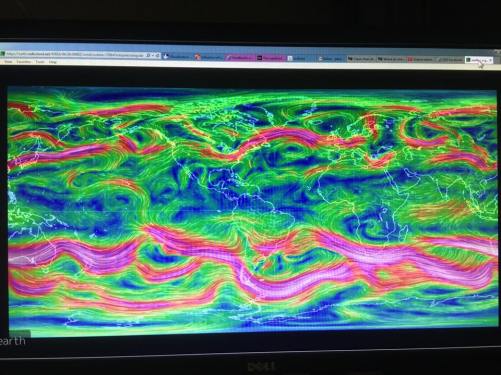
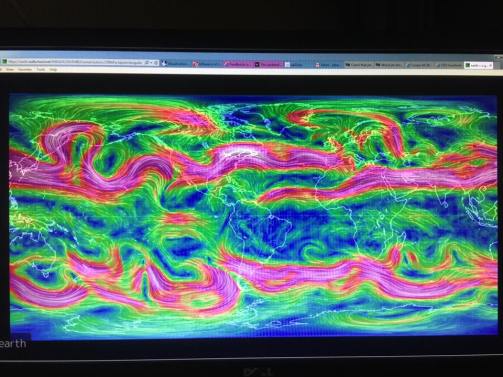
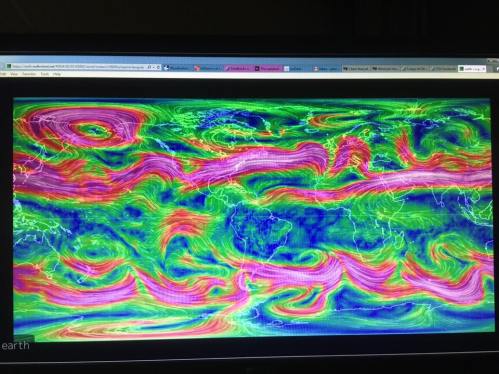
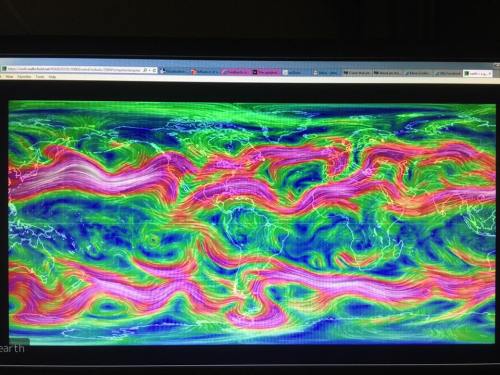
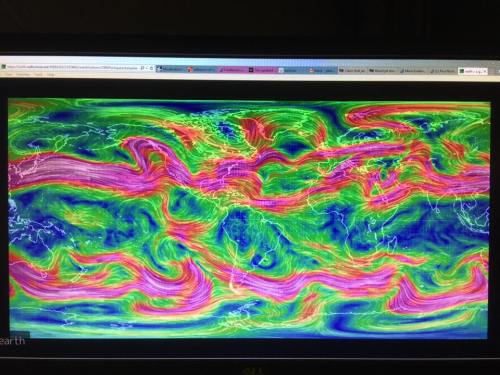
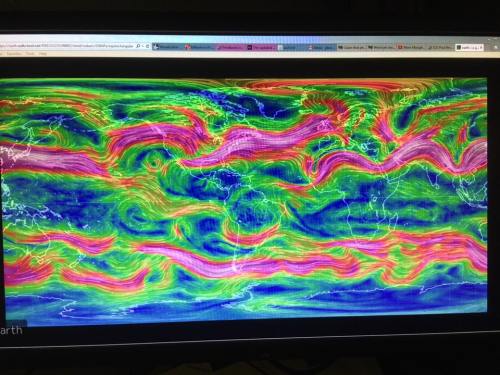
No comments:
Post a Comment
Note: only a member of this blog may post a comment.